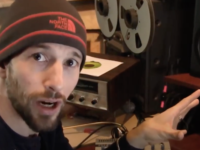Longtime Steely Dan collaborator Michael Leonhart’s career has spanned more than three decades. At 17, he’d already won a Grammy. He’s also worked with Bill Frizell, Levon Helm, the Plastic Ono Band, Bruno Mars and David Byrne, in addition to co-producing Donald Fagen’s 2012 solo album Sunken Condos. Leonhart joins Preston Frazier to discuss Bona Fide, his current project with rapper JSWISS. They’ll take a deeper dive into other signature moments in the second installment of this interview:
PRESTON FRAZIER: How did your new collaboration with JSWISS come about?
MICHAEL LEONHART: I had the residency at the Jazz Standard with my 18-piece orchestra. I planned out a couple months in advance and was going to jump into the Blue Note Suite and do some exciting stuff like Duke Pearson and some early Wayne Shorter and some weird stuff. I thought, “I’m gonna find the source of some weird hip-hop stuff.” Then I thought about a drummer who would be doing the shows who could handle hip-hop and an MC. Black Thought from the Roots came to mind as the MC, but he was going to be very busy. E.J. Strickland and his brother Marcus Strickland recommended JSWISS. I spoke to him, and he was legit. [A Tribe Called Quest’s] “Electric Relaxation” [and] Eric B. and Rakim’s “Untouchables” were songs we tried out. Right away, at the first show, we both had a blast. We decided we should come back next month for part two.
We did the second show and I said, “You know, if you’re around you have an open invitation to come back.” I had in my book for the orchestra 60 songs and one of them is David Axelrod’s “The Edge,” which Snoop and Dre did. I said that the songs aren’t like a museum piece, you could do your own verses on the song “Next Episode” – and it just started happening, and it was just the way friendships and collaborations build. It was natural and we started writing songs.
PRESTON FRAZIER: Was his first appearance on your orchestral album, The Painted Lady Suite?
MICHAEL LEONHART: He’s not on Painted Lady. The first appearance is actually a weird B-side single that Sunny Side put out of the orchestra live at the Jazz Standard. The first release of the orchestra’s actually was “Electric Relaxation,” A-side, and “Untouchables,” B-side. He and I had started writing original music together and I knew it wasn’t going to be for the orchestra. I decided to involve my samplers and horns and the two of us writing stuff. I don’t go in with a preconceived notions. I get a sense of what’s going to be cool for the orchestra or great for a small group, or if I don’t know what pile the song fits in. So with J I thought, “Let’s not try to force this into something. Let’s just write great songs,” and that’s how it developed.
PRESTON FRAZIER: Take us into the writing process for Bona Fide.
MICHAEL LEONHART: We started in late December 2019, with one song called “On the Money.” We were working in person in the studio, and I we did his vocals together in the studio and then January stuff started getting a little weird. February of 2020, stuff starting a really weird – and then lockdown happened. Once we all kind of, you know, came out of our madness, we decided to keep writing remotely. We would talk on the phone and we had more days and then I was just making beats and I was making more basic going tracks so around April and May of 2020 it was a a lot of back and forth, a lot of FaceTime.
I give him the freedom to do it with the lyrics, and I take the reign on the production, and then we start kind of sharing concepts.
PRESTON FRAZIER: You’re sharing concepts with regard to the lyrics. What about the music?
MICHAEL LEONHART: It’s the same with the when I produced Fagen’s Sunken Condos. You don’t write lyrics with Donald. If he was stuck and I heard something egregious, I would say something. If I thought that we were really missing something glaring then I would say, “Hey, that caught my attention” but [with Donald Fagen] most of the lyrics come in fully formed. Same with JSWISS. He’s a real writer, so as the producer if I hear something that doesn’t feel right or that just doesn’t make sense or I know he can do better then I’ll say something. If I have a beat texture that doesn’t feel like it hits hard enough he would say, “Hey can we make that hit harder,” and I would make it hit harder – and that’s the collaborative process.
PRESTON FRAZIER: The first album of yours that I bought was it was Glub Glub Vol. 11; the second album was Slow. I still am captivated by Slow, but it seems like such a shift away from Glub Glub Vol. 11. How have your demos and preproduction process changed since then?
MICHAEL LEONHART: Really not a lot. That’s the funny thing. I found a whole bunch of sketches at my parents’ apartment – recordings, demos – and I realized it hasn’t changed that much. I’m a little more patient. I’m not quite as difficult on myself, but the process is the same like in terms of channeling how I demo.
PRESTON FRAZIER: How fleshed out are your demos, or are they a finished product?
MICHAEL LEONHART: I’ve always loved the finite structure of four track and eight track, and I have a 4/24 – it’s a tape-cassette [recorder] that I keep in the studio. The sound is cool, but it’s also the structure that prevents me from going too far down the rabbit hole. Now I use Logic and some Pro Tools, but I can catch myself going off the rails.
PRESTON FRAZIER: The title track on Bona Fide features drummer Nick Movshon, who also plays live drums on four other pieces. Let’s discuss that song.
MICHAEL LEONHART: Nick Movshon is first a bass player; he’s the bass player on most of Amy Winehouse’s albums. He’s a great bass player. We played together in several bands, including Sharon Jones and the Dap-Kings, among others. He plays drums amazingly well too. Typically, guys like Mark Ronson use Nick on bass and Homer Steinweiss on drums. Those two have played together since they were in high school or even before, and that’s cool. Homer’s on a bunch of tracks on the Bona Fide album, and so is Nick. They each do their different thing and provide a different flavor.
I don’t think of Nick as a bass player solely. I believe that his first language is bass, and he speaks drums fluently, or maybe you hear a little accent when you talk drums the same way my first instrument is a trumpet. And it’s also kind of piano speed and dexterity, but harmonically I can sit there and go to all these places – but on drums, I have an action. I play drums a lot of people, but it’s not my main instrument, and I have a lot of flaws and shortcomings on the instrument. But I have a unique feel. On the song, I vari-speeded up about 20 percent, and it starts to sound like Clyde Stubblefield, kind of like an Al Green sound when I pitched it up. Very much like a piccolo snare.
PRESTON FRAZIER: Then on “The Chase,” you used a guest trumpeter?
MICHAEL LEONHART: Yes, Keyon Harrold. There was a WBGO tribute to Fagen, and I was asked to MC it.
And at the last minute, they asked, “How do you feel Keyon Harrold plays trumpet?” Yeah, he’s excellent, and we hadn’t met, but he’s played with Common. He’s a deep jazz trumpet player. He also can understand the hip-hop world. He’s played with Snoop Dogg and Robert Glasper, and he did all the trumpet stuff for the Miles Davis biopic with Don Cheadle. So I was putting together a lot of charts, and it was a lot of spinning plates, and he came in. It sounds great. There was a second opportunity to work together, and he blew me away again. He just played, but also had no attitude. I enjoy being a leader yet if you hire me to be a sideman, I do what serves a greater purpose and I don’t need to be an orchestrator. I thought it would be nice to get other people involved in the JSWISS album, and he was a great fit. So it was the same dance of trust, and he just crushed it.
- Nosotros, “Mentiras” (2024): One Track Mind - April 10, 2024
- Nick Finzer, Christian Fabian, Rachel Z + Others: Five for the Road - April 5, 2024
- Terry Blade on ‘Ethos: Son of a Sharecropper’: Something Else! Interview - March 10, 2024




